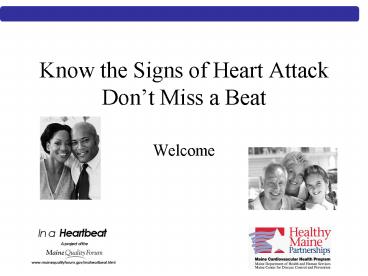Know the Signs of Heart Attack Don - PowerPoint PPT Presentation
1 / 20
Title:
Know the Signs of Heart Attack Don
Description:
Blood flow through the coronary arteries is blocked by the clot, causing a heart ... Heart attacks often begin with vague symptoms that slowly intensify. ... – PowerPoint PPT presentation
Number of Views:79
Avg rating:3.0/5.0
Title: Know the Signs of Heart Attack Don
1
Know the Signs of Heart AttackDont Miss a Beat
- Welcome
2
Introduction
- Do you know a friend or relative who has
had a heart attack, or have you ever
had a heart attack yourself?
3
Facts about Heart Disease
- Cardiovascular disease (CVD) 1 killer since 1900
- 2,500 Americans die of CVD each day
- Estimated Costs 403.1 billion dollars in 2006
- Over 2,000 Mainers die of heart disease each
year, including heart attack - Heart Attack is a major form of CVD
- 1.2 million coronary attacks estimated this year
- Nearly half of these people will die
- 330,000 coronary heart disease deaths occur
- out-of-hospital, or in the Emergency
Department each year
4
What is a Heart Attack?
- Heart disease develops over time as fatty
build-up, or plaques, narrowing coronary
arteries, restricting blood flow to the heart. - Plaque ruptures, releasing a blood clot.
- Blood flow through the coronary arteries is
blocked by the clot, causing a heart attack - If blockage continues, heart muscle dies
5
What does it look like?
6
Warning Signs of Heart Attack
- Chest pain or discomfort
- Pain or discomfort in the jaw, neck or back
- Feeling weak, lightheaded or faint
- Pain or discomfort in the arms or shoulders
- Shortness of breath
911
7
Heart Attacks in Women
- Often report discomfort rather than pain
- Somewhat more likely to experience
- Shortness of breath
- Nausea/vomiting
- Back or jaw pain
- Pain or discomfort in chest is also a sign
- Half of all heart attack deaths
8
Go in an Ambulance
- Person having a heart attack will be seen more
quickly - EMTs communicate with ER doctors
- ER can prepare for arrival
- EMTs can monitor condition andbegin treatment
- Time saved is muscle saved
9
Delay Can be Deadly
- Patient delay is the biggest cause of not
getting care fast. - Do not wait more than a few minutes5 at the
mostto call 9-1-1.
10
Why do we delay?
- Think symptoms are due to something else
- Afraid or unwilling to admit symptoms are
serious - Embarrassed about
- Causing a scene
- Having a false alarm/bothering the EMT
- Do not understand need for getting to hospital
fast
11
What People Expect a Heart Attack to be Like
- Crushing chest pain
- Sudden, intense, falls to the floorlike in the
movies - Sometimes a heart attack can be like this but
12
.sometimes symptoms may be different than you
expect
- Heart attacks often begin with vague symptoms
that slowly intensify. - Pain or discomfort can be relatively mild.
- Symptoms may come and go.
- Heart attack symptoms vary widely
- from person to person
13
Uncontrollable Risk Factors
- Age
- Race/Ethnicity
- Gender
- Family history of early heart disease
- Previous heart attack, stroke or other signs of
heart disease
14
Controllable Risk Factors
- Smoking
- Diabetes
- High blood cholesterol
- High blood pressure
- Overweight/obesity
- Physical inactivity
15
Lifestyle Changes
- Reduce intake of fatty foods and eat more fruits
and vegetables - Walk 30 minutes a day
- Exercise prevents stroke, heart disease and other
conditions - Check out www.healthymainewalks.org
16
Dont Miss a Beat!
- With any one of these symptoms
- Call 911 Immediately!
17
Steps to survival
- Learn heart attack warning signs.
- Talk with family and friends about warning signs
and calling 9-1-1. - Talk to your doctor about heart attack risk and
what to do to reduce your risk - Watch for signs in friends and family and act
quickly call 9-1-1.
18
For More Information
- Local Contact
- website
- phone
- Maine CDC Cardiovascular Health Program
- email dlouder_at_mcd.org www.healthymainepartner
ships.org/mcvhp - Maine Quality Forum, In a Heartbeat
- email carrie.hanlon_at_maine.gov
www.mainequalityforum.gov/inaheartbeat.html
19
Resources
- American Heart Association Fact Sheets,
research, brochures www.americanheart.org - National Heart, Lung and Blood Institute
www.nhlbi.nih.gov - Your Local Healthy Maine Partnership Risk
factor, heart disease and stroke resources
www.healthymainepartnerships.org
20
You are the key!
- Survey of todays presentation and materials
- Follow-up survey
- THANK YOU!































